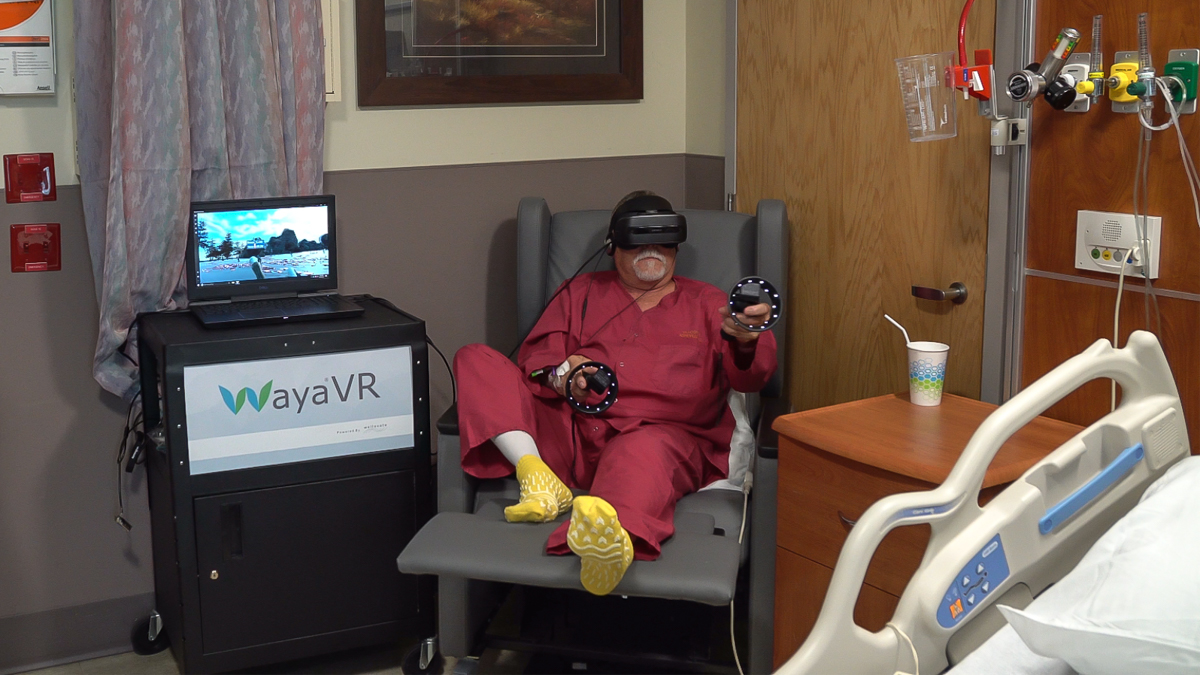The lines between the virtual and real world continue to blur, providing profound experiences and limitless opportunities that once only seemed possible in science fiction. While most people think of virtual, augmented, and mixed realities – collectively called extended reality (XR) – as tools for gaming and movies, through the Veterans Health Administration Innovation Ecosystem (VHA IE) Extended Reality Network, VHA is using XR to revolutionize how and where Veterans receive care.
The XR Network, spearheaded by VHA IE’s Care & Transformational Initiatives portfolio, enables Veterans nationwide to receive XR sessions to treat challenges like post-traumatic stress disorder (PTSD), anxiety, depression and chronic pain. Veterans who choose to experience XR care might spend 30 minutes walking through a peaceful forest, listening to the soft sounds of waves on the beach, or collecting coins in an engaging memory game. As one Veteran put it: “That was like going to see a good movie – you don’t want it to end.”
For Veterans suffering from chronic pain, XR sessions offer pain reduction with diminished use of opioids. One survey of Veterans found a 72% reduction in opioid usage for post-operative patients receiving XR treatments. For Veteran patients, this success is twofold: they experience the positive benefits of XR, while also reducing potential negative side effects of opioid therapy.
Caitlin Rawlins, a Registered Nurse who leads the Virtual Reality program for the Western North Carolina VA Healthcare System, once administered virtual reality sessions to a Veteran who was wheelchair bound: “As the Veteran walked through the virtual outdoor environment complete with a campfire, trees, rocks, rivers and wildlife, she recounted her previous experiences volunteering with the local nature center prior to her limited mobility; through virtual reality immersion, she was transported to a world where her negative stressors did not exist.” This Veteran is not alone – 89% of Veterans in a quality improvement study reported a decrease in stress after receiving immersive virtual reality treatments.
The XR Network
Extended reality as a tool or therapy is currently offered at more than 35 VA sites across the nation, with more sites added monthly. The XR Network includes VA frontline staff, VA researchers, medical center leaders, and external collaborators from industry, academia and other government agencies. Together, the XR Network is made up of thought leaders helping to advance the use of XR throughout VA to better serve Veterans. Through knowledge sharing, staff training, and clinical evaluation of XR, the network is building XR projects from the ground up and scaling successful pilots. The XR Network supports VA facilities at any and every stage of interest and development, serving as a force multiplier that transforms individual efforts into nationwide impact for Veterans.
Dr. Anne Bailey is an emerging tech clinical specialist with Care and Transformational Initiatives in the VHA Innovation Ecosystem. She is also actively involved in the VHA XR Network as the co-chair of the Advisory Committee.
Caitlin Rawlins, RN, is the interim innovation specialist for the Western North Carolina VA Health Care System and is an integral leader in VA’s Extended Reality programs. She piloted the first distraction-based Virtual Reality program in the VHA.
Topics in this story
More Stories
The Medical Foster Home program offers Veterans an alternative to nursing homes.
Watch the Under Secretary for Health and a panel of experts discuss VA Health Connect tele-emergency care.
The 2024 National Veteran Suicide Prevention Annual Report provides the foundation for VA’s suicide prevention programs and initiatives.







Does this treatment platform support the new wireless Oculus Quest 2 VR system from Facebook?